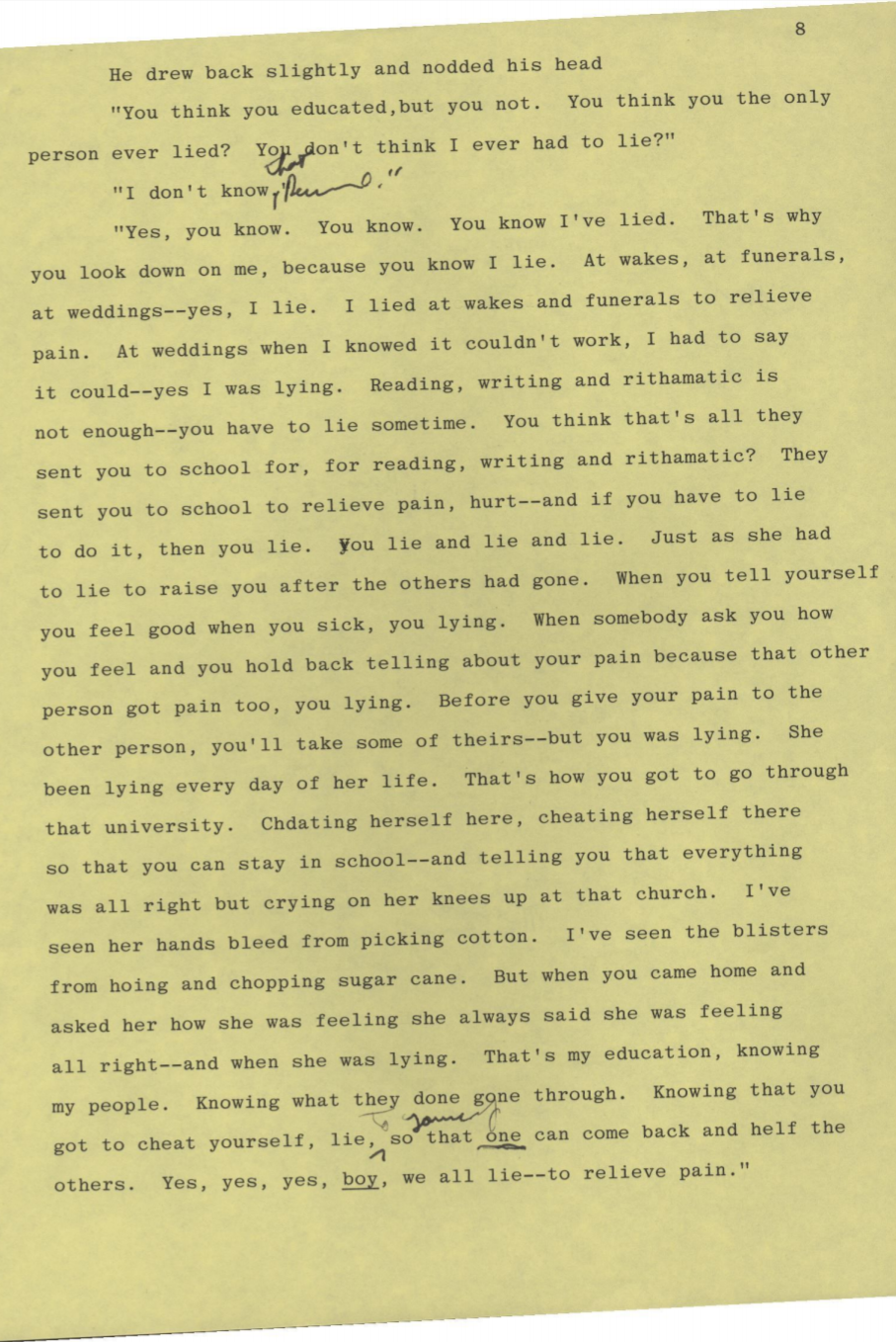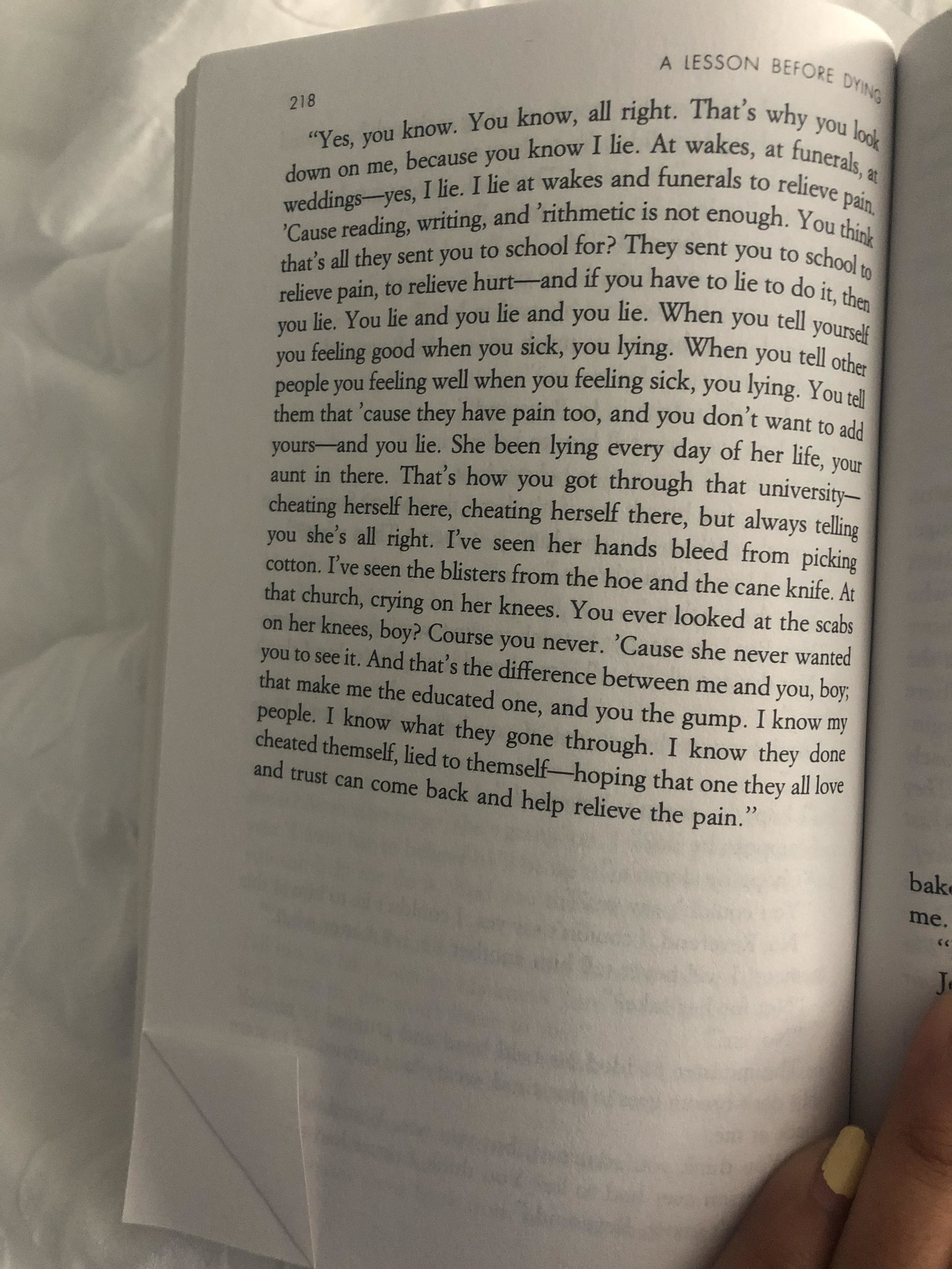Taken at the Ernest J. Gaines Institute at the University of Louisiana at Lafayette
I remember looking at the syllabus a couple of days before leaving for this trip to grasp a basic understanding of the order of things we would be doing. I made sure to have the books or at least figure out how I could Amazon Prime them to the hotel in time for each deadline. I saw that we would start our journey in Grand Isle, move to New Orleans, then go to Baton Rouge and Cajun Louisiana for a couple days, until we end our trip back in New Orleans. All of this seemed pretty random to me at the time, but now that we’ve arrived at our last novel in the series of 6 that we were assigned, I understand just how carefully this trip was curated. All of the novels we’ve read have led up to the most heart-wrenching, emotional one: A Lesson Before Dying by Ernest J. Gaines.
We arrived at Baton Rouge on Memorial Day and the city was practically empty. Almost every restaurant was closed and there were barely any people or cars on the streets. It was such a stark contrast from the lively and always bustling streets of New Orleans, but a good place to get a lot of reading done and a necessary change for the novel. A Lesson Before Dying takes place in the late 1940s in a small town north of the capitol along False River. The novel tells the story of a black man named Jefferson who is accused of and convicted for a crime he didn’t commit and is given the death penalty. Grant Wiggins, the local school teacher, is given the job by his aunt and Jefferson’s godmother Miss Emma to make sure he dies a man, with pride and dignity. Out of all our experiences with bookpacking so far-this has probably had the most real life connections to the story.
Side by side picture: an archive of the draft on the left, the published copy on the right
In the towns of New Roads and Oscar, we had the opportunity to visit the courthouse and jail that inspired the ones written in the novel, actually meet Dr. Ernest J. Gaines and ask him questions about the novel, his life, and his writing process, and also look at archives of his writing and previous drafts of the book. I think something that has become esspecially apparent on this trip was how much we as readers offer interpertations of a book that were not held or intended by the author. This isn’t necessarily bad as it can make a book relatable across generations, but it is also important to stay true to the original purpose of a novel. For example, I had asked Dr. Gaines if the character of Vivian in the novel was based off his wife Dianne and their relationship. He simply responded, “No, but she did maybe look like her”. This made the book almost even more real in a sense because it showed how the book wasn’t based off Gaines’ personal life since he wasn’t using it to share his personal story. In addition, going to the Gaines Center and having the opportunity to physically flip through the drafts of his hand written notes and edits showed just how meaningful each word and phrasing was to creating the final picture. Some changes were so miniscule side by side but emphasized a completely different aspect of the characters or the plot. It encouraged us to see how meticulous the process of writing that Gaines described to us when we talked with him and that we experienced while reading the book truly was.
The most impactful part for me personally was when we visited the jail, where Jefferson stayed and where Grant and other families went to visit Jefferson every week. This is where a large part of the novel takes place and essentially how the reader learns about Jefferson’s state of mind. Just an hour before our visit, I read the part of the novel that included Jefferson’s personal diary in which he jotted down his thoughts on the last days leading up to his execution. Here are a couple of things that were written:
“this was the firs time i cry when they lok that door behind me the very firs time an i jus set on my bunk cryin but not let them see or yer me cause i didn want them think rong but i was cryin cause of bok an the marble he giv me and cause o the peple com to see me cause they hadn never done nothing lik that for me befor”
“i dont want sleep at nite no mo jus catnap in the day while they got lite and they got noise cause i dont want drem bout that door ever time i shet my eyes”
“sun goin down an i kno this the las one im gon ever see but im gon see one mo sunrsise cause i aint gon sleep tonite”
Reading Jefferson’s diary and imagining what it would be like to be in such an impossible situation was incredibly difficult. Then going beyond the written words: walking through the actual jail cells, seeing where people would be hung, how small of a space it all was and feeling the closeness of the walls and the strong grip of the horrible heat slowly suffocate you was unbearable even for 20 minutes…I can never fully imagine how someone would endure it for hours, days, years. It was in this moment that I understood why this book was last, and why we had to leave light and breezy New Orleans in order to shift and force our mindset to appreciate the heaviness of the novel. This was the peak of our course in empathy. While we will never be able to fully place ourselves in Jefferson’s shoes (he only had two- one for work, and one for church) but, the lesson he learns is a universal one. The lesson the characters in the novel and the reader realizes is that no matter how hopeless a situation is and how hard the struggle is to find faith, there are people who love you and when you can receive and accept that love, hope can be found.
Another reason this book came at the perfect time in the trip is because we had the ability to truly get to know and care about each other. I was reading Jefferson’s diary on a dock where a mother duck was providing shade for her ducklings, they all cuddled close together underneath her until they were ready to go for a swim in the lake. And it made me realize I had my own friends here to love and support me too. They were there to wipe my tears, understand the sadness, and give me a much needed cuddle.
“‘The only thing I believe in is loving you.’”




